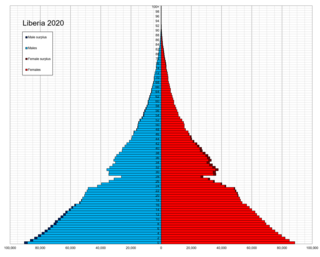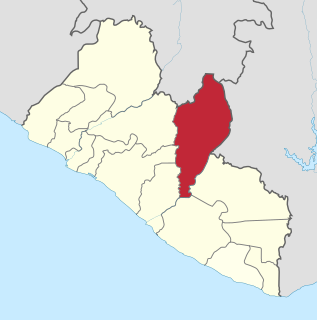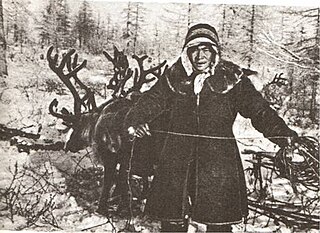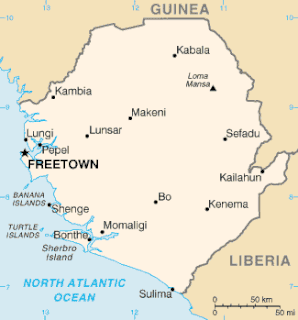Related Research Articles

As of 2006, Liberia has the highest population growth rate in the world. 43.5% of Liberians were below the age of 15 in 2010. With recent civil wars being fought along ethnic lines, Liberia is a multiethnic and multicultural country.

The Mano River Union (MRU) is an international association initially established between Liberia and Sierra Leone by the 3 October 1973 Mano River Declaration. It is named for the Mano River which begins in the Guinea highlands and forms a border between Liberia and Sierra Leone. On 25 October 1980, Guinea joined the union.

Nimba County is a county in northeastern Liberia that shares borders with the Republic of Côte d'Ivoire in the East and the Republic of Guinea in the Northwest. Its capital city is Sanniquellie and its most populous city is Ganta. With the county's area measuring 11,551 square kilometres (4,460 sq mi), Nimba is the largest of Liberia's 15 counties. The county has six statutory districts. As of the 2008 Census, it had a population of 462,026, making it the second most-populous county in Liberia.

Dolgans (Russian: долганы; Dolgan: Дулҕан Dulğan; self-designation: долган, тыа-киһи, һака are an ethnic group who mostly inhabit Krasnoyarsk Krai, Russia. They are descended from several groups, particularly Evenks, one of the indigenous peoples of the Russian North. They adopted a Turkic language sometime after the 18th century. The 2010 Census counted 7,885 Dolgans. This number includes 5,517 in former Taymyr Autonomous Okrug.

The Mano River is a river in West Africa. It originates in the Guinea Highlands in Liberia and forms part of the Liberia-Sierra Leone border.
The International Contact Group on Liberia (ICGL) is an ad-hoc formed International Contact Group composed of members from the United Nations, the Economic Community of West African States (ECOWAS), African Union, World Bank, United States, Ghana, Nigeria, United Kingdom, Germany, Spain and Sweden. The ICGL was formed from a need for an international and regional response to the Second Liberian Civil War. The ICGL was cited by the Accra Comprehensive Peace Accord with a number of tasks, most notably ensuring the faithful implementation of the accord by all parties. In September 2005, the ICGL and the Government of Liberia signed GEMAP, a novel approach to the problem of systemic political corruption.
The Regional Economic Communities (RECs) in Africa group together individual countries in subregions for the purposes of achieving greater economic integration. They are described as the "building blocks" of the African Union and are also central to the strategy for implementing the New Partnership for Africa's Development (NEPAD).
Conciliation Resources is an independent organization working with people in conflict to prevent violence and build peace, providing advice, support, and practical resources. It also takes the lessons learned to government decision-makers and others working to end the conflict to improve peacebuilding policies and practice worldwide.

United Nations Security Council resolution 1408, adopted unanimously on 6 May 2002, after recalling resolutions 1132 (1997), 1171 (1998), 1306 (2000), 1343 (2001), 1385 (2001), 1395 (2002) and 1400 (2002) on the situation in Sierra Leone, the council extended sanctions against Liberia for its support of rebels in the civil war in Sierra Leone.

United Nations Security Council resolution 1436, adopted unanimously on 24 September 2002, after recalling all previous resolutions on the situation in Sierra Leone, the Council extended the mandate of the United Nations Mission in Sierra Leone (UNAMSIL) for a further six months beginning on 30 September 2002.

United Nations Security Council resolution 1470, adopted unanimously on 28 March 2003, after recalling all previous resolutions on the situation in Sierra Leone, the Council extended the mandate of the United Nations Mission in Sierra Leone (UNAMSIL) for six months until 30 September 2003.

United Nations Security Council resolution 1478, adopted unanimously on 6 May 2003, after recalling resolutions 1132 (1997), 1171 (1998), 1306 (2000), 1343 (2001), 1385 (2001), 1395 (2002), 1400 (2002), 1408 (2002), 1458 (2003), 1467 (2003) and others on the situation in Liberia, the Council extended sanctions against the Liberian government for an additional period of twelve months until 7 May 2004 and imposed a ban on imports of its timber for ten months.

United Nations Security Council resolution 1508, adopted unanimously on 19 September 2003, after recalling all previous resolutions on the situation in Sierra Leone, the Council extended the mandate of the United Nations Mission in Sierra Leone (UNAMSIL) for six months until 31 March 2004.

United Nations Security Council resolution 1521, adopted unanimously on 22 December 2003, after recalling all previous resolutions on the situation in Liberia and West Africa, the council established a monitoring body to oversee international sanctions against Liberia. It was the final Security Council resolution adopted in 2003.

United Nations Security Council resolution 1562 was adopted unanimously on 17 September 2004. After recalling all previous resolutions on the situation in Sierra Leone, the Council extended the mandate of the United Nations Mission in Sierra Leone (UNAMSIL) residual presence for a period of nine months until 30 June 2005.
International Contact Groups are "informal, non-permanent international bodies that are created ad hoc, with the purpose of coordinating international actors in their aim of managing a peace and security crisis in a specific state or region (single-issue). They are founded and formed out of by states and/or International Organizations/Regional Organizations. They do not have own administrative structures, but are official announced and meet periodically." Since 1977, at least 27 ICGs have been formed.
Gola is a language of Liberia and Sierra Leone. It was traditionally classified as an Atlantic language, but this is no longer accepted in more recent studies.
China Chongqing International Construction Corporation is a Chinese construction and engineering company and subsidiary of Chongqing Foreign Trade and Economic Cooperation Group Co., Ltd. (CFTEC) It is known as a project contractor for road building in Africa.

The Liberia–Sierra Leone border is 299 km in length and runs from the tripoint with Guinea in the north-east to the Atlantic Ocean in the south-west.
References
- ↑ "International Contact Group on the Mano River Basin, Region of West Africa". Luxembourg Presidency of the Council of the European Union. 2005-03-21. Retrieved 2011-07-16.